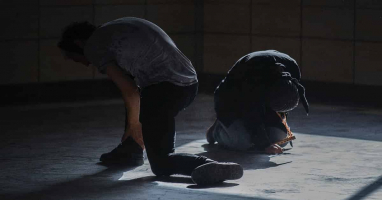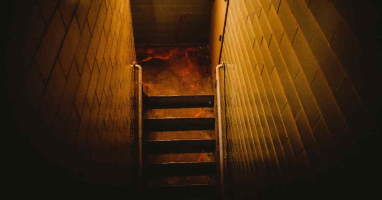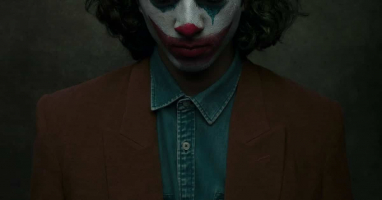I wrote this article in Japanese and translated it into English using ChatGPT. I also used ChatGPT to create the English article title. I did my best to correct any translation mistakes, but please let me know if you find any errors. By the way, I did not use ChatGPT when writing the Japanese article. The entire article was written from scratch by me, Saikawa Goto.
Introduction
Movies and books covered in this article

I will write an article about this movie/book
What I want to convey in this article
The power of the “screenplay” that dominates the scene through the extreme exclusion of “movement” and “emotion” is tremendous.



If I hadn’t seen “Drive My Car,” I never would have seen this film, and I’m so glad I did.
Three takeaways from this article
- This film in which actors we don’t know talk with little movement is just wonderful.
- Magic (or Something Less Assuring)” (my favorite), “Door Wide Open” (the most hilarious), and “Once Again” (the most brilliantly scripted).
- I also love that each work has a certain kind of “madness” that runs through it.



After watching “Drive My Car” and “Wheel of Fortune and Fantasy”, I was blown away by the incredible of director Hamaguchi Ryusuke.
Self-introduction article


Please refer to the self-introduction article above to learn about the person writing this article. Be sure to check out the Kindle book linked below as well.


Published Kindle books(Free on Kindle Unlimited)
“The genius Einstein: An easy-to-understand book about interesting science advances that is not too simple based on his life and discoveries: Theory of Relativity, Cosmology and Quantum Theory”
“Why is “lack of imagination” called “communication skills”?: Japanese-specific”negative” communication”
The quotes used in this article are based on notes taken at the movie theater from movies in Japanese and are not direct quotes from the foreign language original movies, even if they exist.
A Masterpiece that Excludes “Movement,” “Emotion,” and “Famous Actors,” and Captivates the Audience with Only the “Script”


I had no intention of watching this movie called “Wheel of Fortune and Fantasy.” The reason was that the trailer and poster were very stylish, and honestly, I didn’t think it would be the type of movie I would find interesting.


The impression you got from the trailer was that it was just another “good atmosphere” movie, wasn’t it.



I think there are quite a few people who, like me, see the trailer and poster and feel “I don’t need to watch it.”
The reason my opinion changed was because I watched the movie “Drive My Car.”


As I mentioned in the above article, I had also decided not to watch “Drive My Car.” However, when I watched it, I was amazed by its brilliance. Then I found out that “Wheel of Fortune and Fantasy” was also a film directed by Hamaguchi Ryusuke, and that was when I changed my mind to “watch it” for the first time.
Wow, it was really amazing. It was so shocking and outrageously interesting.


The Amazingness of being able to Create a Masterpiece with Just “Screenplay” and “Actors”
While I don’t know the specific details of the behind-the-scenes of movie production, it’s easy to imagine that there are many elements that make up a film. These include things like set design, lighting, music, costumes, CGI, and editing, among others. By skillfully combining these various elements, a film should come into existence.




However, I felt that “Wheel of Fortune and Fantasy” severely restricted the elements that make up a movie. Specifically, I got the impression that it was made up only of “script” and “actors.” Moreover, even if, while the presence of “actors” is essential, it’s never like well-known actors are appearing in the film. In that sense, it could be said that this is a movie with nothing but a “script.”



In fact, the only actors whose faces I recognized were Furukawa Kotone and Shibukawa Kiyohiko.
They’re not exactly super famous or anything.


I think the distinctive feature of this movie is the lack of “movement” and “emotion”. This is a common characteristic of Hamaguchi Ryusuke’s works that I have seen, but especially in this movie, I felt the lack of “movement” stood out.
The movie is an omnibus of three stories, each of which is not related to each other, but each story has almost fixed situations. In the first story “Magic (or Something Less Assuring),” the scenes are “taxi” and “office,” in the second story “Door Wide Open,” the scenes are “apartment room” and “university professor’s room,” and in the third story “Once Again,” the scenes are “in front of the station” and “living room of a house.” So the story unfolds almost exclusively within those scenes.
Furthermore, within those fixed situations, there are long continuous shots with few cuts. Additionally, the actors hardly move within those shots. In other words, the audience will experience a movie where they simply listen to the actors speaking in the other side of a fixed camera. Overall, the movie gives a strong impression of a stage play, and could even work as a radio drama.
Exactly it can be said that it relies solely on the script.


In addition, in such a constrained situation where there is little “movement”, even “emotion” is suppressed. This seems to be a common technique used by the director Hamaguchi Ryusuke. As I wrote in the article about “Drive My Car,” during the stage of reading the script, he instructs the actors to say their lines “without putting emotions into them.”


“Wheel of Fortune and Fantasy” may not be as emotionless as “Drive My Car,” but it definitely lacks emotions in a way that cannot be compared to a typical movie. Because of this very peculiar approach, it can even lead to a sense of reversal, in that “the more emotionally charged the scene is, the more fake it feels”.
It’s not like they’re trying to create fear by speaking in a monotone and expressionless manner.



Although it appears as if there is no emotion, and it’s really strange that it is established.


A little off topic, but such idea of “seeming emotionless yet still established” or “scenes with emotions feeling fake” might be very modern. Nowadays, there are many media where individuals can share photos and videos, so it can be said that we are overflowing with “information conveyed through movement or tone of voice”. And many people may be getting tired of it. The sense of the times may have swung too far in one direction, and there is a possibility that there are many people who feel “tired of being forced to show emotions”.


That’s why I feel like the idea of “communication without emotions being more real” might work.


Let’s get back on track. As I’ve written so far, “Wheel of Fortune and Fantasy” extremely excludes “movement” and “emotion”. Based on that, summarizing the “appearance” of this movie can be done as follows:
An unknown actor acts with a performance that lacks “emotion,” and the movie has little “movement” such as action and cut.
And the fact that such a film has been made into what can only be described as a wonderful piece of work just astonished me.





Even as I write this article, I can hardly believe it myself.
As for any readers who are only reading this article without watching the movie, I think they may doubt its authenticity.
And the biggest and only element that makes it possible is the “screenplay.”
Of course, even with a “screenplay,” it is impossible to make a good movie without “actors” who can perform it appropriately. However, in this movie, above all, the presence of the “screenplay” is so strong that it will shock you with its brilliance.


Let’s now delve into the content of each work.
Episode 1: Magic (or Something Less Assuring)
My favorite story among the three is “Magic (or Something Less Assuring).” This story is not only about the “script,” but also about the presence of the actress Furukawa Kotone, and the complex emotions that intertwine among people, making it a work that I personally enjoyed.


Above all, what was truly amazing was the conversation between the two women in the taxi that continued for a while from the beginning. I loved this conversation so much that I felt like I could listen to it forever.


To be honest, the content is unremarkable, the just content of this is a girls’ talk between a model and her hairstylist friend. The hairstylist talks about how she spent 15 hours talking to a man she just met and the model listens with nods and agreement. They originally met for a work meeting, but decided not to work together and ended up talking for 15 hours.
The conversation is just so perfect.


The script for this is written by the male director Hamaguchi Ryusuke, so it’s amazing, right?



I want to know how women feel when they watch this scene, and I feel it’s really realistic.
The hairstylist is aware that the story she’s telling is “unnatural” and “illogical.” She keeps talking with a feeling like “If it had been my normal self, I would never have been able to be that, but somehow it was possible in that space at that time. It was very strange.” I think she is asking for her agreement, saying, “You know, such things happen, don’t you? you can understand, don’t you?”
The model’s reaction to the story is also great. She understands that the hairstylist is aware of “I’m saying something strange” and furthermore responds with a perfectly timed quip, “Isn’t that weird?” That timing of her response is exquisite.


“You won’t believe what happened!” “That sounds strange, doesn’t it?” “Yeah, but it really did happen. And then…” “Wow, that’s unusual.” “Yeah, even I think so. But…” “Oh, I see what you mean.” The model woman’s responds act as a catalyst, sparking the hair and makeup woman’s desire to talk and leading into talking about a interactions with a man. And the model woman responds to the story in a way that can only be described as exquisite.
Furthermore, I felt astonished in the point that the conversation had to convey the situation only by itself, but it was not at all “aimed at the audience”.




In movies and novels, there are scenes where the situation is explained only through the dialogue between characters. However, this can often feel unnatural and forced. While it may be unavoidable to a certain extent in order to convey the story, it can also create doubts in the audience’s mind, such as “Would two people with that kind of relationship have that conversation now?” or “Do friends usually have this kind of conversation?”
However, the taxi scene in question is a stunning example where both the “conversation between best friends that makes we feel like they have these kinds of talks all the time” and the “conversation that explains the situation to the audience” are perfectly balanced. Without going into specifics, this conversation is essential to the development of the story and needs to vividly portray “what kind of experience the hairstylist woman had.” The conversation manages to fulfill this role while still feeling natural as a conversation between two women (at least to me, male viewer), and I was truly amazed.





I think I could watch this taxi scene for two hours straight.
In “Drive My Car,” the scene talking about the high school girl who was a lamprey in her past life was memorable, wasn’t it?
Now, after the hairstylist woman gets out of the taxi, the model woman takes some action. I won’t go into specifics about what happens next in this article, but I personally enjoyed more the part that takes place in the “office” even more.


She had the image of a “trendy ordinary girl” in the taxi, but that impression completely changed when she arrived at the office. Her words and actions were completely nonsensical and could be described as “completely insane,” but at the same time, she was aware of her state of mind. By leading conversation with a clear awareness of the “madness” that she herself encompasses, a completely unpredictable exchange takes place with no clear purpose or destination.
I thought it was really great.


I think the dialogue in the office scene was perfect because the two characters’ relationship was built on “emotionless communication”. By not showing emotions, their “madness” was amplified. The girl who had been nodding naturally in the taxi suddenly became someone unpredictable in the office, which created a gap that made me excited. Overall, it’s a wonderful piece of work.
Episode 2: Door Wide Open
“Door Wide Open” is the funniest piece among all.




In this story, everyone in the audience was laughing, right?



What’s even better is that the behavior of the characters, which doesn’t seem to have that intention at all, makes us laugh unintentionally.
The story unfolds with a tone that doesn’t convey any warmth or humor from start to finish. The characters are not aware that what they are doing is funny or trying to make others laugh, and they act naturally according to their own reasoning. However, their actions are so off the mark that audienced can’t help but burst out laughing.


The story begins with a University Professor of French Department receiving the Akutagawa Prize (one of the most famous literary awards in Japan). And, for various reasons, a woman visits the professor’s room to seduce him. Although she is a housewife, she enrolled in university again and seduce the professor with a certain purpose in mind, but I don’t touch on the reason in this article.
The housewife suddenly starts reading the prize-winning work to the professor. The work contains a description of a “woman shaving a man’s hair of genitals,” so the housewife closes the door so that her voice won’t be heard outside. However, the professor calls out “Door wide open” and opens the door again.


The audience understands that the housewife is trying to seduce the professor, but he is completely unaware of that. The interactions between the professor, who has an unusual sense of things, and the housewife, who is trying to seduce him in her own way, are a perfect example of a missed connection. And yet, they mesh strangely in unexpected ways, leading to unforeseen developments. The professor’s words make the housewife cry, and the gift she gives him for gratitude leads to a strange result. Overall, it was an impressive deployment that made us feel as if we had listened to a fashionable rakugo.



I’ve heard that laughter arises from “tension” and “relaxation,” and this story follows that theory perfectly.
The “tension” caused by the professor not speaking at all and the “relaxation” caused by his off-the-mark remarks is exquisite, isn’t they.


Now, this is not related to the story itself, but there is a very impressive scene. The professor encourages the housewife, saying “You have talent,” and he uses this expression to describe her “talent”:
An ability to remain in the non-verbal, non-determined realm.
I felt that this was a very good expression.




The conversation between the two somehow turned into an atmosphere of counseling, and the housewife confesses that she thinks her weakness is having a “weak will and easily giving in to temptation.” However, the professor evaluates that as the “ability to remain in the non-verbal, non-determined realm.”


In the movie, the professor’s idea of “talent” is not explicitly explained, so let me offer my interpretation.
Generally, people who can logically and clearly explain things are considered superior, and what these people verbalize often becomes the “standard of society.”


On the other hand, the housewife is troubled because she cannot grasp why she behaves in that way, even herself. She understands that it deviates from the “standard of society,” but she is not particularly eager to go against it. This would be a state of “remaining in the non-verbal, non-determined realm”.
She cannot accept this state, but the professor explains its “goodness” in the following way.


Embrace the value that is solely for yourself without adhering to the “standard of society”.
Some people would only be saved by doing so.
Of course, it might not happen, but if nobody does, nothing will ever happen.
In this world, there are people who suffer because they cannot conform to the “standard of society”, and the professor argues that the existence of people who live outside that standard lightly may be a “salvation” for those who can’t conform. Of course, it may not actually lead to anyone’s “salvation”, but if nobody does, nothing will happen. Therefore, it’s important to cherish the “ability to remain in the non-verbal, non-determined realm” and live with it. That’s his message.


I was thrilled by this exchange.



From the setting and the exchange at the beginning of the story, I couldn’t imagine that it would turn out to be such a good story.
Even as a housewife, it must have been unexpected and touching.


After leaving the professor’s office and returning home, the housewife thinks about what to write in a thank-you email. Although the final content is simple, initially she wrote the following:
It was a strange time, but from now on, I think I can live a little more comfortably.
This scene suggests that the exchange with the professor was very important.


On the other hand, towards the end of the conversation, the professor said something like this:
So, I wanted to talk to you before I received the Akutagawa Prize. But if I hadn’t won it, we wouldn’t have had the chance to talk at all.
The professor’s wording is not simple and can be hard to understand, but in summary, he would have meant that he was glad they were able to talk. Furthermore, this statement is even more suggestive in light of the story’s ending. It might have been better to leave it at “we wouldn’t have had the chance to talk at all,” and the two who oddly ended up getting on well each other might actually have been better off not meeting. I felt that the work as a whole was very brilliant, including the brilliant narrative landing that made me feel that way.


Chapter 3: Once Again
“Once Again” is a story where the power of the “screenplay” is simply overwhelming within “Wheel of Fortune and Fantasy”.
The other two chapters also had amazing screenplays, but “Once Again” was just exceptional, wasn’t it?



I think it’s amazing how they were able to bring to light a situation that would not normally make sense.


For this story, I think it’s best to watch it without knowing anything beforehand, so I won’t go into specifics in this article. Roughly speaking, the story is about a woman who visits Sendai for the first time in 20 years to attend a class reunion, and happens to have a conversation with a woman she meets by chance on the escalator in front of the station. At first glance, the way the story begins may seem common, but the situation that makes us think “I see where this is going” and the strange developments that follow are just amazing in this work.




After watching “Once Again,” what I feel is that “I didn’t feel any discomfort in the first half that should have been full of discomfort, and in the second half where discomfort is expressed, I no longer feel discomfort.” Even as I write this sentence, I myself feel like I’m writing something strange, but I think those who have seen the movie will understand and empathize.
The story aims to hit the exquisite balance between the sense of “that couldn’t possibly happen” and “I might actually do the same thing if faced with the same situation,” and I feel that it’s a miraculous feat that this bizarre story manages to work.


Conclusion
In this film, three completely different types of stories are depicted, but each one has a common point where “madness” is reflected in some form. In “Magic (or Something Less Assuring)”, the “madness” exhibited by the model woman is depicted, while in “Door Wide Open”, the “madness” of a professor who has a completely different sense of common sense and a housewife with impure motives is portrayed. Both of these stories can be said to have a certain “malice” underlying their “madness”. On the other hand, in “Once Again”, the abnormality of a situation that doesn’t make one feel any such “malice” becomes a kind of “madness” in its own right.


I don’t really like the expression “you’ll regret if you don’t watch it” because the words themselves feel contradictory, but I can’t help feeling that way about this work. It’s a fantastic piece that maximizes the power of the “script” and has the “actors” wonderfully bring it to life, all composed of simple yet essential elements.


Published Kindle books(Free on Kindle Unlimited)
“The genius Einstein: An easy-to-understand book about interesting science advances that is not too simple based on his life and discoveries: Theory of Relativity, Cosmology and Quantum Theory”
“Why is “lack of imagination” called “communication skills”?: Japanese-specific”negative” communication”







コメント